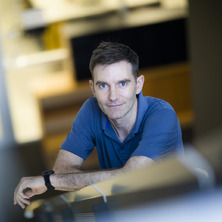Dr Kerry Roper and Associate Professor Peter Simpson
Attend this event online: https://uqz.zoom.us/j/129947296
Clinical research in the Gordon Lab: from Biobank to Biomarkers
 Presented by Dr Kerry Roper Sakzewski
Presented by Dr Kerry Roper Sakzewski
Dr Kerry Roper Sakzewski joined the Gordon Group as a Post Doctoral Research Fellow in late 2018. Her previous post-doctoral research experience spans work in evolutionary developmental biology and across a number of human diseases, in positions both in Australia and abroad. She received her PhD with Dean’s Commendation from the University of Queensland in 2006 and her Bachelor of Science with distinction from the University of Victoria, Canada in 1999.
In her current position, she leads the clinical research aims of the Gordon Group. This involves a number of intertwined projects that include developing and maintaining a biobank of neurodegenerative diseases, exploring biomarkers for Parkinson’s disease and involvement in clinical trials aimed at improving disease outcomes for people with Parkinson’s disease.
Improving genomic testing for lung cancer patients
 Presented by Associate Professor Peter Simpson
Presented by Associate Professor Peter Simpson
A/Prof Peter Simpson holds a joint teaching and research position at UQ, teaching Pathology to year 1 and 2 medical students enrolled on the Faculty of Medicine MD Program and is a Research Group Leader at the UQCCR. He is a Fellow of the Faculty of Science in the Royal College of Pathologists of Australasia, and he is a member of the International Cancer Genome Consortium (Breast Cancer group). He has almost 20 years experience undertaking molecular pathology research to better understand the development and progression of breast and lung cancer.
Breast cancer is the most common cancer diagnosed in the Australian population, whilst lung cancer causes the most cancer-related deaths. This presentation will focus on our multi-institute, collaborative work in lung cancer, funded by Cancer Council Queensland, Cancer Australia and Australian Genomics.
Companion molecular diagnostics are a crucial component of diagnostic practice and therapeutic decision making for lung cancer patients, with somatic mutation testing contributing to the selection of effective therapeutics. Endobronchial ultrasound transbronchial needle aspiration (EBUS-TBNA) sampling of hilar or mediastinal lymph nodes is an important procedure to make a formal diagnosis of lung cancer, particularly in patients presenting with advanced, inoperable disease. The tissue specimens obtained are small yet are required for a sequential series of tests that has been described as a protracted ‘diagnostic odyssey’. Our program of work is focused on optimising procedural and molecular approaches to obtain rich diagnostic information from such small diagnostic aspirate samples.
About UQCCR Seminar Series
UQCCR Seminar Series
The UQ Centre of Clinical Research (UQCCR) Seminars are held fortnightly on Wednesdays from 12 pm - 1 pm (except during school holidays) currently on Zoom. The series features topics in multiple research fields, presented by invited international, interstate and local researchers.
